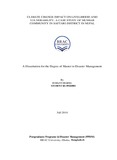Climate change impact on livelihood and vulnerability: a case study of mushar community in saptari district in Nepal

View/Open
Date
2010-09Publisher
BRAC UniversityAuthor
Sharma, SushantMetadata
Show full item recordAbstract
Climate change impact and vulnerability towards the change on the poor people has always been significant aspect of issue and discussion worldwide. With the green house gases increasing various consequences of climate change is pressurizing the resources on which people are dependent for their livelihood. Various studies done in country level and worldwide has proven that Nepal is one of the worst sufferers of climate change. Climate change is also being proved as doldrums for making people more vulnerable to shocks and stresses more over burden on livelihood capitals i.e. natural, physical, social,financial and human.
The main objective of the paper was to assess vulnerability and impacts of climate change on livelihood among Mushar communities in Saptari district of Nepal at Koshi basin. For this research participatory tools for assessing climate change was used with various other tools like interview, observation etc for the validating the findings. To assess the information literature were reviewed from different journal article, published books,government policies, meteorological and hydrological data and other unpublished thesis work and articles.
Different livelihood resources like agriculture, water, forest, public health and settlements are vulnerable to climate change. The result shows that there is increasing trend of rainfall and discharge in the Koshi River. Also the average temperature is in the increasing trend for the Koshi basin inviting different trouble for the livelihoods aspect in form of flood,cold wave, illness, livestock disease etc creating more challenge in the livelihood of the Mushar community. Though all households in the VDC( Village Development Committee) are vulnerable to climatic crisis, the problem is more acute for the poor, landless, children, women, large sized family among the Mushar family. To cope with the impacts the community is use saving and credit, wood selling and other activity,disaster preparedness plan and disaster management committee as strategy.Awareness raising and capacity building are among the coping strategies provided by the government institution and NGO's in the area.
Thus the study suggest to address the climate change challenges for the community with the help of study at micro level and making plans policies and programme of adaptation for the Mushar community to withstand the shocks of climate change for the most vulnerable group.
